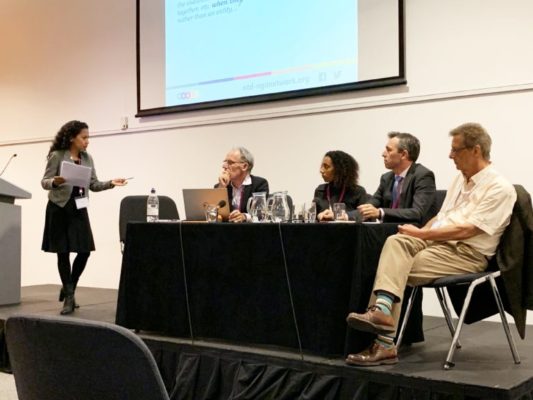24 September 2019 · Global Partnership for Zero Leprosy
GPZL at the 2019 NNN (Neglected Tropical Disease NGO Network) Conference

Last week in Liverpool, UK, the 2019 NNN (Neglected Tropical Disease NGO Network) Conference brought together over 400 people from 54 countries. Despite representing diverse diseases, the delegates shared the common vision of ending neglected tropical diseases (NTDs) through collaboration and partnership. Dr. Mwele Malecela, Director of Control of NTDs, WHO, presented the opening keynote presentation, commending the overarching theme of the conference, stating: “We are many partners, but we have one voice. We have many roles but one goal.”
Examples from the field of leprosy were discussed in many workshops and the Global Partnership for Zero Leprosy (GPZL) was highlighted in the following sessions:
- Dr. Rabindra Baskota, National Leprosy Program Manager of Nepal presented key findings of the recently-conducted country review by GPZL and WHO. He explained how questions from the NTD Action Framework were used to determine priorities for action, now part of Nepal’s Zero Leprosy Roadmap.
- Dr. Erwin Cooreman, WHO Global Leprosy Programme, opened the GPZL and ILEP hosted-leprosy session with a comprehensive presentation. He discussed the latest leprosy data and the draft 2030 NTD Roadmap. This roadmap presents clear indicators and targets for all 23 NTDs, including leprosy. A Global Leprosy Strategy will follow soon afterward. While the Global Leprosy Strategy will align with the NTD Roadmap, it will give an expanded view of the leprosy targets, including socio-economic issues.
- In the same leprosy session, Dr. Christine Fenenga, GPZL Secretariat, presented the Zero Leprosy Country Model as well as the GPZL Action Framework. She discussed the first country review in Nepal, lessons learned, and next steps for other country reviews.
- On the last day of the conference, Geoff Warne, ILEP CEO and GPZL leadership team member, participated in a panel discussion on partnerships and their effectiveness. GPZL was highlighted, along with partnerships across various diseases, such as trachoma and malaria. The importance of transparency, communications, and member engagement were emphasized.
The GPZL will be exploring many of the ideas from discussions and the workshops. The NNN conference provided a great opportunity for sharing ideas and meeting new people.